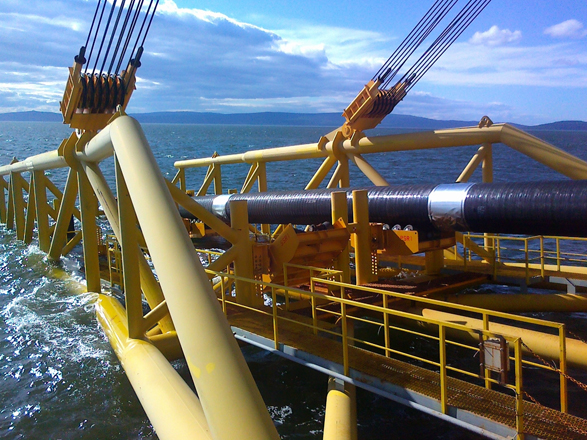Baku, Azerbaijan, June 9
By Elena Kosolapova - Trend: Russian arguments over the Trans-Caspian pipeline are clearly made for the benefit of its commercial and political interest, European expert on energy issues told Trend.
Earlier, Russian Foreign Ministry spokesman Alexander Lukashevich said that Western environmental organizations prefer to ignore the potential threats to the Caspian region's ecology, and in the EU reports, saying that the Trans-Caspian pipeline poses no threat to the environment, "politics blatantly dominates over environment."
"The environmental aspect of this issue primarily concerns the Caspian littoral states without any exception. In this regard, all five Caspian states have the voting right," the Russian diplomat said.
Marco Giuli, an analyst on energy issues at the Brussels-based European Policy Centre noted that Russia has been for a long time against the Trans-Caspian pipeline.
"The Trans-Caspian pipeline failure in the past has been one of the main drivers to Nabucco's failure, which went to Russia's advantage. Clearly Russia is still opposed to the project," he said.
This is for Russia not only about gas, but also about preventing non-Caspian countries from establishing a military presence in the Caspian, the expert said. Russia is strongly supported by Iran in this respect, he noted. Russia's security concerns might re-emerge in a new geopolitical situation, according to the expert.
"Ecological evaluation of the Trans-Caspian pipeline project, would need a technical assessment," he said.
Giuli believes that the legal status of the Caspian Sea bed remains the most divisive issue and the most critical for the Trans-Caspian pipeline. He noted that to understand if the Trans-Caspian pipeline could be built in near future one has to figure out why it failed in the past, and whether the reasons for the past failure have changed.
The most relevant changes are that Russia no longer offers an export outlet to Turkmenistan, with that Turkmenistan now needs to look to the West to diversify its client base, according to the expert. Moreover the tensions in Ukraine are providing further political impetus to the EU Commission's efforts to reach deals with the countries involved in the Southern Gas Corridor, and more backing by EU member states. On the other hand, Giuli stressed that a factor of major uncertainty remains the Turkish Stream.
"If it is realized at the planned size, it might be able to price out the Caspian gas in both Turkey and Europe. It will be up to Turkey to make a choice between cheap gas and its political ambitions in the Caspian region," he said.
The expert noted that Europe remains committed to have Azerbaijani gas.
Meanwhile there are significant uncertainties related to the future of EU gas demand, he said.
"All in all, one cannot say that the investment climate is spectacularly better, but there are windows of opportunity," Giuli said.
The Trans-Caspian pipeline project is regarded as the optimal option for delivering Turkmen resources to European markets. The project envisages the laying of around 300 kilometers long gas pipeline under the Caspian to the shores of Azerbaijan. Further Turkmen can be transported to Turkey which has mutual borders with European countries.
The project may be implemented as a part of huge Southern Gas Corridor project designed to transport gas from the Caspian region to European countries. The gas to be produced within the second stage of Azerbaijani Shah Deniz field development is designed to open the Southern Gas Corridor.
The negotiations between the EU, Azerbaijan and Turkmenistan on the Trans-Caspian gas pipeline began in September 2011. However Russia and Iran have always spoken against the Trans-Caspian pipeline due to ecological issues during the pipeline's construction. The unresolved status of the Caspian Sea has been regarded as the main factor hindering the implementation of the project.
The official position of Ashgabad regarding the project is that the consent of the countries whose territories are involved into the project is enough to build a pipeline. Azerbaijan has repeatedly expressed readiness to provide its territory, transit facilities and infrastructure for realizing the project.
Earlier the European Commission Vice-President for Energy Union Maros Sefcovic said that Europe intends to find a technical and legal basis for the Turkmen gas supply via Azerbaijan.
Turkmenistan ranks fourth in the world for the volume of natural gas reserve. This is while the reserve of the certain fields such as Galkynysh and Yashlar make up 26.2 trillion cubic meters.
The natural gas production in Turkmenistan exceeded 76 billion cubic meters, while the export of this fuel surpassed 45 billion cubic meters in 2014. The country plans to produce over 80 billion cubic meters of commercial gas in 2015.
Edited by CN
Follow the author on Twitter: @E_Kosolapova






